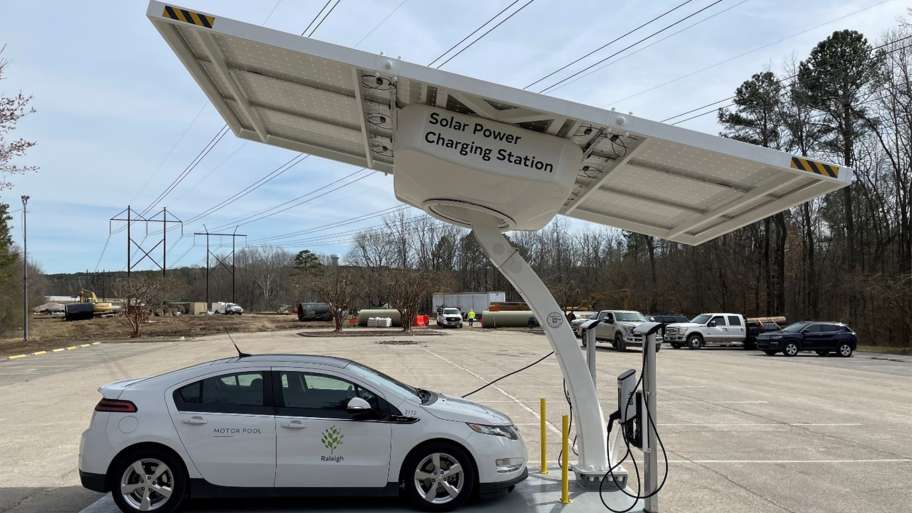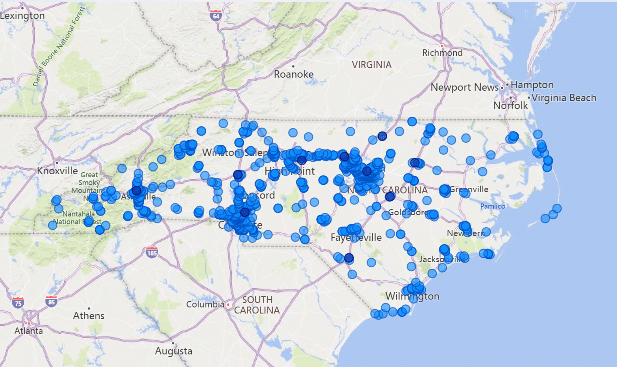Raleigh, NC Leading the Transition to EVs and Clean Fuel Technologies
In Raleigh, North Carolina, transportation is the largest contributor to community greenhouse gas (GHG) emissions—accounting for approximately 52% of total emissions. This car-dependent reality, dominated by traditional gas-powered vehicles, has significant environmental consequences. However, the City of Raleigh is taking bold and innovative steps to change that. Through its Community Climate Action Plan (CCAP), Raleigh is driving efforts to reduce transportation emissions, promote cleaner alternatives, and support a shift toward more sustainable, multi-modal travel options.
Leading by Example: Transitioning the City Fleet
Raleigh is setting the tone for climate action by transforming its fleet of over 4,700 vehicles and equipment from fossil fuels to electric vehicles (EVs) and clean alternative fuels. This includes a wide array of City-operated vehicles such as police cars, fire trucks, dump trucks, lawn equipment, and public transit buses. The City’s EV Implementation Rollout Strategy lays out a detailed roadmap for this transition over the next decade. The plan is built around equity, infrastructure expansion, and maximizing GHG reductions—while also addressing situations where electric technology is not yet viable by incorporating alternative clean fuels.
Since 2016, Raleigh has made significant strides under its Fuel and Fleet Transportation Plan, transitioning more than 80% of its fleet to clean alternative fuels. It also became the first local government in North Carolina to operate large equipment using renewable propane—the cleanest available fuel for such applications.

Electrifying the Future: EV Charging and Community Support
Raleigh isn’t just electrifying its own fleet—it’s working to support the broader community’s transition to EVs. The City is actively expanding public charging infrastructure at community centers across Raleigh and providing resources to help residents, developers, and businesses navigate EV adoption.
In the photo above, a City of Raleigh EV is shown charging at an innovative Beam Global solar-powered EV charging station.
One key initiative is the EV Ready Playbook, created in partnership with Advanced Energy. This guide outlines best practices for EV infrastructure planning and installation and is intended to be adopted by municipalities across North Carolina. It’s part of the broader Sustainable Business Toolkit, a resource hub for local organizations looking to take meaningful climate action, including Duke Energy’s EV Charger Prep Credit.
Although the City isn’t the primary provider of EV charging, it plays a vital role in enabling public access to charging and ensuring the infrastructure is ready as demand grows.
From Waste to Wheels: Innovative Renewable Energy Solutions
One of Raleigh’s most exciting clean transportation projects is the Bioenergy Recovery Project—a first-of-its-kind initiative in which the City will convert wastewater into renewable natural gas (RNG). This RNG will be used to fuel transit buses, including those operating within the expanding Bus Rapid Transit (BRT) system. Essentially, the city will transform what residents flush down their toilets into clean fuel—a remarkable innovation in circular sustainability.
GoRaleigh, the City’s transit provider, is already operating a growing number of electric buses and has made strategic investments in electric charging infrastructure to support future expansion. GoRaleigh is working toward meeting the City’s goal of reducing greenhouse gas emissions by transitioning its entire fleet of 115 buses made up of 80% renewable compressed natural gas buses (CNG) and 20% battery-electric buses (BEB). Since 2019, Arcadis has supported GoRaleigh’s deployment of 71 CNG buses and the start of a pilot in 2022 with five BEBs.
Regional and Statewide Impact
As part of its transparency and community engagement efforts, Raleigh maintains an online dashboard for CCAP transportation and land use initiatives and provides updates through its 2024 CCAP Implementation Report.
Beyond the city limits, Raleigh is part of a broader effort to expand EV infrastructure across North Carolina. Statewide charging infrastructure is being developed with the support of federal funding, and resources like the North Carolina Sustainable Energy Association’s EV charging map help drivers plan routes and find reliable charging stations.

See the map from North Carolina Sustainable Energy Association here: https://energync.org/dataplatfor/.
Dark blue sites are part of the National Electric Vehicle Infrastructure (NEVI) Formula Program.
EVinfo.net’s Take
We’re very impressed with the City of Raleigh, North Carolina. We hope other cities across America take from Raleigh’s playbook on how to transition from climate-harming gas vehicles to cleaner transportation, including support of EVs and EV charging. EVs are the most eco-friendly transportation, as well as being the most cost-effective. EVinfo.net proudly serves the EV industry with innovative marketing services.

Electric Vehicle Marketing Consultant, Writer and Editor. Publisher EVinfo.net.
Services